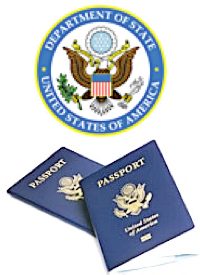
It seems that people are under much less scrutiny when entering the United States than leaving it inasmuch as the State Department has proposed a new biographical questionnaire as part of the passport application that makes a variety of bizarre inquiries.
The five-page questionnaire poses average questions such as one’s date of birth and employer. However, it goes on to ask questions such as:
Who was present when you were born? Can you remember every address you’ve ever had? How about every place you’ve ever worked? Were you circumcised? Did you receive pre-natal or post-natal medical care?
Likewise, it requests the lifetime employment history and address history, as well as personal details about siblings and parents.
While the State Department asserts that the questionnaire is voluntary, it adds that “failure to provide the information requested may result in processing delays or the denial of your U.S. passport application.”
Consumertraveler.com bemoans the difficulties in completing the proposed application:
The State Department estimated that the average respondent would be able to compile all this information in just 45 minutes, which is obviously absurd given the amount of research that is likely to be required to even attempt to complete the form.
The State Department provided a 60-day notice for public comment in the Federal Register regarding the proposed questionnaire, which began on February 24 and ended on Monday, April 25. The notice justified the proposed questionnaire as follows:
The primary purpose for soliciting this information is to establish citizenship, identity, and eligibility for a U.S. Passport Book or Passport Card. The information may also be used in connection with issuing other travel documents or evidence of citizenship, and in furtherance of the Secretary's responsibility for the protection of U.S. nationals abroad.
The notice is in compliance with the Paperwork Reduction Act of 1995, which forces governmental agencies to minimize the paperwork burden for individuals and organizations, minimize costs in the collection of information, provide information to the public on a timely basis, and ensures the greatest possible public benefit of information obtained.
BoingBoing explains that the proposed questionnaire is intended for those who are unable to produce a birth certificate at the time they are applying for a passport. The State Department asserts that the questionnaire will be “used to supplement an application for a U.S. passport when the applicant submits citizenship or identity evidence that is insufficient or of questionable authenticity.” Unfortunately, it fails to define what constitutes “insufficient or questionable authenticity.”
BoingBoing adds,
But as the FA suggests, the circumstances in which people unable to provide a birth certificate will be given this form (rather than the traditional bureaucratic investigation) are not spelled out either; further, the form itself remains a Kafkaesque impossibility for most people to complete.
It’s not clear from the supporting statement, statement of legal authorities, or regulatory assessment submitted by the State Department to the Office of Management and Budget (OMB) why declining to discuss one’s siblings or to provide the phone number of your first supervisor when you were a teenager working at McDonalds would be a legitimate basis for denial of a passport to a U.S. citizen.
Libertarian website Reason.com has called the application “disturbing” and “creepy.” Writer Radley Balko contends that the questionnaire has the potential to be a “tool to allow the State Department to turn down a passport when they can’t find a legitimate reason.”
It’s noteworthy that the opposition to the questionnaire appears to be bipartisan, as the ultra-liberal Village Voice could not resist the opportunity to mock some of the more bizarre questions found in the application.
In addition to the proposed questionnaire, the State Department has added the following requirement for all those wishing to apply for a passport:
Beginning April 1, 2011, the U.S. Department of State will require the full names of the applicant’s parent(s) to be listed on all certified birth certificates to be considered as primary evidence of U.S. citizenship for all passport applicants, regardless of age. Certified birth certificates missing this information will not be acceptable as evidence of citizenship.
It is apparent that the federal government wishes to make the process of acquiring a passport more difficult, but what remains unclear is: Why?




